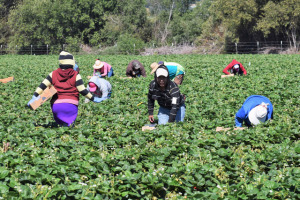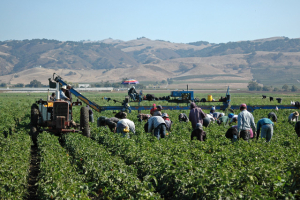Report on the CAFPC to the California State Board of Food and Agriculture by Michael R. Dimock, February 4, 2014
February 5, 2014 Michael R. DimockGood morning President McNamara and members of the Board. I appreciate the invitation to come share with you an update on the work of Roots of Change, which is now focused on development of theCalifornia Food Policy Council. The Report before you is the first product of that body and is an important indication of the growing awareness of food systems and agriculture among the residents of the State of California.
Before I dive into the California Food Policy Council, let me give you a brief update on Roots of Change, which acts as the backbone support for the council, providing funding and staffing for Council operations.
First, I want to state that Roots of Change is now a project of the globally oriented, but Oakland-based,Public Health Institute, which is a $100-million dollar nonprofit operation dedicated to “turning great ideas into healthier communities.” I come to you today in my role as president of Roots of Change, a strategic advisor to the California Food Policy Council and a project director of the Public Health Institute.
As you know Roots of Change has been working in California since 2004 to promote a vision of food and farming that places the focus on principles and practices that will ensure the survival of agriculture in perpetuity within our state. We believe this can be done by making irrefutable the role of farmers and ranchers and their myriad supporting businesses as the foundation for health and resilience. We think the rapid advance of climate chaos, the continuing human degradations from diet related diseases like cancer and obesity, and the ubiquity and persistence of water pollution, and rural poverty are indicators of where we must focus as an organization.
Roots of Change pays particular attention to the threats of racism and economic injustice, poor nutrition, and the industrial thinking that leads to overuse of nitrogen fertilizer and an unsustainable dependence on broad-spectrum toxic chemicals, fossil fuels, and subtherapeutic antibiotics in concentrated animal feeding operations. Roots of Change will use its energy to advocate to Council members that farmers and ranchers and other food system businesses need robust incentives and clarified paths to addressing these many challenges.
In June of 2011 in this very room, Secretary Ross from CDFA and Secretary Dooley from the California Department of Health and Human Services, hosted a meeting of advocates from the across the state who had been working with Roots of Change in their local communities for many years. Fifty representatives from food policy councils, food system alliances, nonprofits and foundations attended. The question before us was: shall we create a California Food Policy Council to combine the voices of the many local food system policy groups working across the state. The state’s Health in All Policies Task Force, associated with the Strategic Growth Council, had called for such an entity to be formed. The answer at the end of that day was a resounding “yes,” and so forming and empowering the Council became the focus of Roots of Change.
There are now 30 such local food policy entities operating from Humboldt in the north coast to San Diego in the South coast, from San Bernardino in the south’s Inland Empire to Shasta at the base of the Cascades in the north. Taken together these 30 regions represent over 80% of the state’s registered voters. Twenty of these 30 local entities are now voting members of the California Food Policy Council.
Before you are the guiding principles of the Council, ratified in 2012. Its members seek to speak with a clear and unified voice to California’s policymakers who are setting many parameters within which our future food system will operate. The other document before you is the Council’s first product. The Report on Legislation Related to Food and Farming is not a scorecard, but rather an overview of the Council’s perspectives on the Legislature’s decision making in 2013.
We used the Council’s guiding principles to filter and prioritize the 70 bills related to food and farming that were introduced last year and found 27 that we wanted to fully analyze with policy experts from the local, state and federal level. You can see the list of those who participated in the analysis on the report’s back cover. Of the 27 analyzed, ten were deemed emblematic because they addressed challenges important to the Council. These ten were tracked through the legislative process. Their story became the basis of our analysis.
This first report seeks to help legislators and policymakers within the Brown Administration to understand the Council’s perspective and it begins the work of building a database of decisions by legislators on policies important to California’s food movement. As stated before, the Council did not grade legislators or comment on their individual decisions. Rather, the Council looked holistically at 2013 to derive the following five points of interest it wanted legislators to hear.
First, we were very glad that five of our ten highlighted bills were passed and signed by the Governor. This was a good sign that the Legislature and the state are headed in a positive direction. We were particularly pleased with gains made by farmworker communities and CalFresh recipients.
Second, we think most legislators need a deeper understanding of the root causes of problems within the food system. And we think legislation should be oriented toward those causes, not seeking band aids for symptoms. For example, CalFresh is essential given the level of suffering within our state, but hunger is a symptom of poverty. The real issues before the state is wealth distribution and income inequality, which are tied to education, industrial, labor and tax policies.
Third, we’d like to see more incentive-based legislation that motivates farmers, ranchers and food businesses to seek health and resilience in everything that they do. In a capitalist system where per unit margins are low, operators need a compelling reason to invest in the long-term viability of the food system. Many of us in the Council believe that California has never gotten its fair share of federal farm bill money for resource stewardship work. Perhaps it is time for a state program that would supplement federal funding and provide the needed incentives.
Fourth, this state has invested far too little in food and farming systems given the importance to our state’s economy and our people’s everyday lives. We think that we need a long-term revenue stream that will empower this department and community-based organizations to do the work needed to form a truly healthy and resilient food system. The one bill that offered a potentially robust revenue stream was SB622, the sugar sweetened beverage tax authored by Senator Monning of Monterey County. That bill has some big flaws and it has been held up in Senate Appropriations. But with some amendments, which Roots of Change and allies from the Food Policy Council have offered, and community based-advocacy to win support from leadership and committee members, this bill could be passed and would be transformative for the state.
Finally, we’d like to see a larger number of food system bills introduced in future years and much more creative thinking by Legislators. Assemblymember Phil Ting’s AB551, which became law and creates tax incentives for urban agriculture, is a great example of what can be done when community-based organizations like the San Francisco Urban Ag Alliance and SPUR work together with a creative legislator like Phil Ting. There are a multitude of incredible projects and local policies emerging in the urban core and rural communities that could be taken as lessons and lifted up to the state level by legislators with an interest and understanding of what is possible.
In closing, we believe that the State’s role has grown in importance given the challenge of functionally debating and creating a federal farm bill that will orient us to remain healthy and resilient in the years ahead. Yes, the Congress will pass a bill today, but less than 1% of the bill’s funding is for innovations and evolutions that many in the Council see as essential to the future and only 28% percent of the bill’s funding actually is directed to agriculture.
We believe California could do better by creating a set of integrated policies that will reconnect producers and consumers by illuminating our common dependence on agriculture and natural resources. We think the State should supplement the federal government’s investments because of all the states in the union, California is best situated to model a food and farming system perfectly suited for the 21st century’s many challenges and opportunities.
Thank you.



